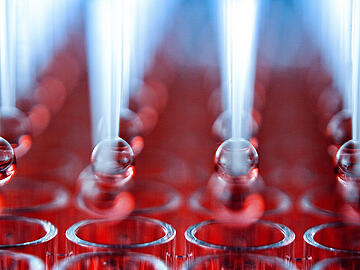
Automated High-throughput Plasmid DNA Isolation from Bacteria Cells Application Note · CyBio FeliX
Introduction
The isolation of plasmid DNA from bacteria is an essential molecular biology technique, used to produce template DNA for desired downstream reactions. Plasmid isolation methods are simple, however, high-throughput plasmid DNA extraction has proved problematic, with issues including low yield and genomic DNA (gDNA) contamination. An automated, high-throughput, multiwell-based plasmid extraction method, with a yield appropriate for downstream applications and free from gDNA, will greatly benefit high-throughput laboratories, where plasmid extraction is often a bottle-neck.
96-well, silica filter-plate plasmid extraction kits are available commercially. In these methods, bacteria cells are harvested and lysed by alkaline lysis, the cellular debris is removed and the extracted DNA is subsequently collected by binding to a silica membrane. Membranes are then washed, prior to the elution of purified DNA. Here, we describe a method developed at SynbiCITE’s London DNA Foundry which uses the CyBio® FeliX pipetting platform to automate a 96-well, silica filter-plate based plasmid DNA extraction protocol.
The use of the CyBio® FeliX pipetting platform allows 96 samples to be processed simultaneously, in approximately 1.5 hours, with the flexibility to process multiple plates at one time. The compact platform reduces the bench space needed for an automated plasmid isolation system in a laboratory and, in combination with a bench top centrifuge and robotic arm, can enable a fully automated system for plasmid extraction. Using this method, an average yield of 65 ng/μl plasmid DNA is isolated from bacterial cultures, with low variability between the samples (± 7.7 ng/μl SD) and in an elution volume of 50 μl. The plasmid DNA samples are also of high quality, suitable for downstream applications such as sequencing or transformation.
Download the complete Application Note
Automated High-Throughput Plasmid DNA Isolation from Bacteria Cells (EN)
Open PDFContact us
The newsletter of Analytik Jena frequently keeps you posted about:
- News
- Trends and developments
- Events
